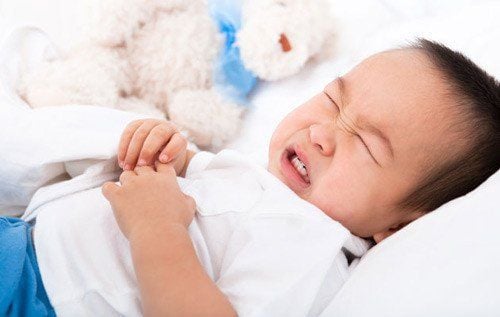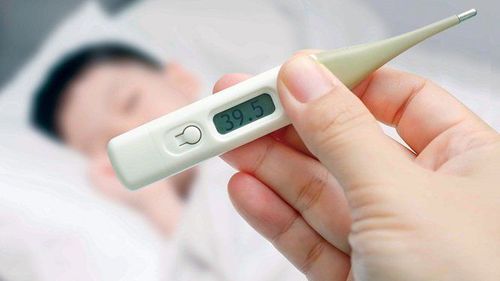This is an automatically translated article.
Every day, we lose body fluids (water and other fluids) in urine, feces, sweat and tears. We replace lost fluids by eating and drinking. Dehydration occurs when more fluid leaves the body than is entering the body. This can happen when a child does not drink enough water or when the body is sick, fluid is lost through vomiting, diarrhea and fever. Dehydration can happen slowly or quickly, depending on how dehydrated and the child's age. Young children and infants are more susceptible to dehydration. In this article, we will provide useful information to help caregivers promptly recognize the symptoms of dehydration in children that need to be recognized early.
1. What is dehydration?
If your child is dehydrated, it means he or she doesn't have enough fluid in the body. One thing to keep in mind is that children are more susceptible to dehydration than adults. Dehydration can occur if a child is given less fluid than he is losing through:
Vomiting Diarrhea Fever Sweating Dehydration can be mild and can corrects by adding water or electrolytes, but dehydration can be moderate, severe, or even life-threatening.

Trẻ em dễ bị mất nước hơn người lớn
2. Symptoms of dehydration in children
Any of the following signs could indicate that your child is becoming dehydrated.
Child has not urinated within 6 hours The child's urine is darker in color and has a stronger odor than usual. The child falls into a coma. The baby's mouth and lips are dry The baby has few or no tears when crying. Some signs that your child may be severely dehydrated are as follows:
Sunken eyes The child's hands and feet feel cold, and the outside shows signs of dryness. The child is sleepy and sleeps excessively or is fussy. Wrinkled young skin. Children only urinate 1 to 2 times a day.
3. What should parents do when their children show signs of dehydration?
Severe dehydration is one of the emergencies. If the child has mild or moderate dehydration, parents can call the doctor for advice and treatment as prescribed by the doctor. The doctor may instruct parents to give their children a rehydration drink to replenish the water and salt that the child's body has lost. However, not all children like the taste of electrolytes, so if your child refuses to drink electrolytes, increase the amount of water he or she usually drinks and ask your doctor about alternatives such as: juices, supplemental drinks,...
However, in the case of a child with severe dehydration, parents immediately take the child to the nearest medical facility for prompt examination and treatment. Here, the child may need to receive electrolytes through an intravenous line in the hospital until the body is rehydrated.
In essence, electrolytes are a type of electrolyte liquid that helps the body to directly replenish electrolytes orally. Types of electrolyte water that can be given to children to treat dehydration include:
Pedialyte Infalyte ReVital

Có thể truyền chất điện giải qua tĩnh mạch để bù đủ nước cho bé nếu bị mất nước nghiêm trọng
These drugs are available in pharmacies, however, parents should also consult their doctor about these products before choosing to use them. However, it is necessary to distinguish electrolyte water from sports drinks because they both contain electrolytes for the body. But sports drinks have a higher concentration of sugar than specially formulated electrolyte drinks to help rehydrate children. The doctor can provide electrolyte usage information to parents based on the child's age and weight. Or parents can read more guidelines of the American Academy of Pediatrics about the amount of solution to use in 24 hours and each time should be given slowly, small sips for children to drink easily.
4. How to prevent dehydration in children.
Parents should make sure that the child has been drinking plenty of water every day, let the child have the habit of drinking water whenever possible, especially on hot days or when the child is sick, the amount of water should also increase. go up. Parents can set fixed time frames for drinking water other than when children are thirsty such as after waking up, after playing sports, before going to bed,... to create a habit for children to drink water regularly. regularly every day.
Should not or limit children to drink soft drinks, especially carbonated soft drinks will affect the enamel of children's teeth. Drinking a lot of soft drinks can also increase a child's risk of obesity, and metabolic diseases. This is not good for the health and future of the child.
Do not increase the amount of juice, juice children drink in a day. This is a recommendation the American Academy of Pediatrics recommends to parents. However, if children like to drink juices or juices, parents can dilute the juices with filtered water for children to use more. For example, if children drink 3 or 4 ounces of juice per day, parents can dilute it to 6 to 8 ounces per day for children to drink.

Hạn chế sử dụng nước ngọt có ga để tránh ảnh hưởng đến men răng và sức khỏe của trẻ
In each different situation, parents can give children different water supplements, for example in the following situations:
Fever : When the child has a fever, parents give the child plenty of water to drink, whatever when, especially when the child is showing signs of fever. Although children may prefer iced drinks, parents should not give children cold water, instead using warm water is better for children's health. If the child has difficulty swallowing, the parent can give the child a pain reliever such as children's acetaminophen or ibuprofen to ease the discomfort. (Note: Never give aspirin to a child, which has been linked to a rare but serious condition called Reye's syndrome.) When the child is overheated due to a lot of activity: On a hot day, when the child is active like running, kicking a soccer ball or just sitting in the room, he also feels stuffy and hot, which can lead to sweating and dehydration. . Therefore, children should drink more water than usual when the weather is hot or when they participate in strenuous activities such as soccer, badminton,... When children have diarrhea: Many children have intestinal problems. sensitive, very susceptible to intestinal diseases, especially acute gastroenteritis, children will lose water due to diarrhea and vomiting. In this situation, the parents absolutely do not give the child fruit juice because this can make the situation worse and do not arbitrarily give the child diarrhea medicine without a prescription from the doctor. Parents should only give children more water to drink, if they feel that the child may be dehydrated, parents can add electrolyte water. When the child vomits: the cause of the child's vomiting may be a virus or an intestinal infection. At this time, the child will feel tired due to dehydration, parents should regularly give the child a small amount of water to drink, add more electrolyte water to the child if necessary When the child has hand, foot and mouth disease: When sick With this disease, children may have a sore throat, discomfort when eating and drinking, so the amount of water they use will be significantly reduced. Parents should give children children's acetaminophen or ibuprofen to ease discomfort, and then give children water with electrolytes often and in small amounts at a time. Cold liquids can ease the pain of children, but parents should also limit and avoid citrus drinks such as orange juice, grapefruit juice, ... because they can cause stinging and burning of the skin. irritated tissue in the throat. If kids don't want to drink their usual favorite drinks, parents can substitute other products like Popsicles, which are a great alternative. It is a good source of fluids for children and can also serve as a snack. Or parents can try some special creams made with Pedialyte or other electrolyte replacement solutions to replace electrolytes.

Phụ huynh cho trẻ bổ sung lượng nước tùy vào tình trạng thực tế
Dehydration is a normal condition of the body at all ages. Normally, the human body loses water through perspiration, feces, urine, and many other sources. For children, dehydration only really becomes dangerous when the amount of water lost is too large and the amount of water replaced does not meet the body's water needs. In some cases, dehydration can become serious, even life-threatening, with fever, vomiting, and persistent diarrhea. Parents should regularly monitor as well as timely replenish water and electrolytes for the baby.
As a key area of Vinmec Health system, Pediatrics Department always brings satisfaction to customers and is highly appreciated by industry experts with:
Gathering a team of top doctors and nurses in Pediatrics : consists of leading experts with high professional qualifications (professors, associate professors, doctorates, masters), experienced, worked at major hospitals such as Bach Mai, 108.. Doctors All doctors are well-trained, professional, conscientious, knowledgeable about young psychology. In addition to domestic pediatric specialists, the Department of Pediatrics also has the participation of foreign experts (Japan, Singapore, Australia, USA) who are always pioneers in applying the latest and most effective treatment regimens. . Comprehensive services: In the field of Pediatrics, Vinmec provides a series of continuous medical examination and treatment services from Newborn to Pediatric and Vaccine,... according to international standards to help parents take care of their baby's health from birth to childhood. Advanced techniques: Vinmec has successfully deployed many specialized techniques to make the treatment of difficult diseases in Pediatrics more effective: neurosurgery - skull surgery, stem cell transplantation blood in cancer treatment. Professional care: In addition to understanding children's psychology, Vinmec also pays special attention to the children's play space, helping them to play comfortably and get used to the hospital's environment, cooperate in treatment, improve the efficiency of medical treatment. If you have a need for medical examination with experienced pediatricians at Vinmec, please make an appointment on the website to be served.
Please dial HOTLINE for more information or register for an appointment HERE. Download MyVinmec app to make appointments faster and to manage your bookings easily.
Reference sources: healthline.com, babycenter.com
MORE:
Children can die if they lose a lot of water due to diarrhea Watch out for the risk of dehydration in children with acute diarrhea Signs your body is dehydrated










